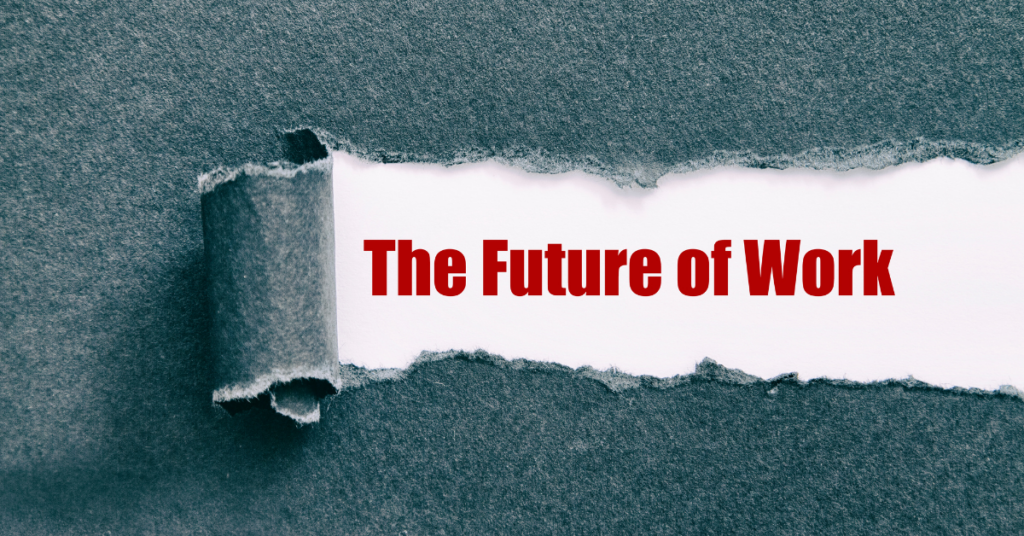What are the Top 10 Future of Work Trends That Will Rule in 2030?

A PwC report on the future of work highlights that workplace 2030 will be segmented into four worlds—Red, Blue, Yellow, and Green. The Red World will consist of changemakers or innovators competing to build unique business solutions. The Blue World indicates capitalism, comprising highly skilled full-time employees and contract workers. The Green World emphasizes corporate responsibility, requiring workers to have high ethical standards. Lastly, the Yellow World will be driven by fairness. It will offer work flexibility and autonomy and make workers feel valued. Based on these four worlds, let’s see what the future of work will look like by 2030.
This blog discusses the following workplace trends that are reinventing the concept of the workplace 2030:
- Top 10 Future of Work Trends for 2030
- Nonstandard Employment
- Remote-First Employment
- Focus on Social Conscience
- Inclusive Workforce
- Quiet Hiring
- Focus on Employee Well-Being
- Increased Reliance on Skills
- Smart Workplace
- Complex Organizational Structures
- Employee Productivity Monitoring
Top 10 Future of Work Trends for 2030
The prevalence of a remote and flexible work culture during the pandemic has made it compulsory for organizations and professionals to see work beyond the traditional 9-5 style. Moreover, the constant hustle culture has dwindled. Professionals are striving for a better work-life balance. Owing to these changes, the following are the most significant future of work trends that will rule by 2030:
1. Nonstandard Employment

The future of work will involve professionals moving beyond their comfort zone and choosing nonstandard employment over traditional roles. As a matter of fact, the modern workforce is seeking work flexibility, autonomy, value, and holistic improvement. Many professionals are opting for freelance or temporary work or multi-employment. Organizations are hiring contract workers to perform various roles instead of full-time employees. LinkedIn’s Future of Recruiting Report 2023 reveals that the annual growth of contract jobs in the US is 26%, whereas the annual growth of full-time roles is merely 6%. Moreover, full-time employees in the US are likely to form only 9% of the workforce by 2030. The above statistics indicate a lack of stable long-term employment in the future. Thus, professionals must learn new skills and industry trends to advance their careers.
ALSO READ: What is Workforce Transformation? Why It Matters and Getting Started
2. Remote-First Employment
Even though many organizations are asking their employees to work onsite, the remote-first employment trend is increasing. It is called the phygital workplace trend, which will allow an omnichannel culture for the future of work. Research suggests that Japan, the UK, the US, Canada, and other countries are facing acute talent shortages. Remote hiring allows organizations to fill this talent gap by attracting a global workforce. According to the State of Remote Work Report 2023, 64.68% of organizations will allow a hybrid or permanently remote work environment. Moreover, to keep up with one of the most impactful workplace trends, business leaders must modify their leadership styles to ensure employee engagement and productivity.
ALSO READ: Top 5 Benefits of Hybrid Work: Why It’s Here to Stay
3. Focus on Social Conscience
A remarkable trend shaping the future of work is environmental and social conscience. Corporate Social Responsibility (CSR) and Environmental, Social, and Governance (ESG) activities enable companies to attract a large talent pool, seek funding, and retain customers. It is, therefore, imperative for businesses to support environmental and social causes. In fact, the demand for green skills like sustainable strategies and research and technical know-how of green technologies is increasing.
ALSO READ: ESG Training: Top 5 Ways It Can Enhance Your Career
4. Inclusive Workforce
Diversity, Equity, and Inclusion (DEI) is one of the top workplace trends for 2030. Indeed & Glassdoor’s Hiring and Workplace Trends Report 2023 reveals that over 70% of the modern workforce in the US is likely to turn down a job offer if the organization does not support DEI initiatives. Thus, employers are investing in DEI training and mentorship programs. A Deloitte survey further shows that multinational organizations in the US have pledged to invest $210 billion on DEI initiatives. Moreover, 90% of CEOs are prioritizing DEI to facilitate systemic changes within the organization. It will boost brand recognition and improve employee well-being.
5. Quiet Hiring
Following the quiet quitting trend, quiet hiring will be the future of work. According to the US News and World Report, this workplace trend has already impacted 80% of modern professionals. Quiet hiring refers to appointing existing employees for senior roles or hiring skilled contractors instead of posting new job listings for full-time roles. One of the primary reasons for quiet hiring is the high employee-replacement cost, which amounts to almost $3 million per day. This trend indicates that new job listings will decrease, resulting in a hypercompetitive work environment. Thus, professionals will have to update their skill sets and showcase the value they can add to an organization to secure new jobs.
6. Focus on Employee Well-Being
The future workplace trends are employee-centric. According to the Indeed & Glassdoor Hiring and Workplace Trends Report 2023, employees are demanding a better work-life balance and a sense of purpose at work. Another report reveals that 91% of employers are allocating more budget and resources for employee well-being. The overall spending on employee wellness is expected to reach $100 billion by 2030. This will increase employee satisfaction and employee retention rate, reducing the rate of job changes.
7. Increased Reliance on Skills
By 2030, the world will gradually witness a skill-based economy. The Future of Jobs Report by the World Economic Forum says that 44% of workers’ skills will be disrupted by 2030, and companies will prioritize skills like cognitive thinking to address the widening talent gap. According to LinkedIn’s Workplace 2023 Report, companies are focusing on building an agile workforce, creating a huge demand for cross-functional skills. Instead of experience or qualifications, companies will focus on transferable skills like data analytics, marketing, critical thinking, and problem-solving.
ALSO READ: Why Upskilling Is so Important in Launching a Digital Transformation
8. Smart Workplace
Increased digital or smart workplaces will be the future of work. It will be characterized by human-machine partnerships and the massive usage of frontier technologies like generative AI, collaborative AI, Extended Reality (XR), and metaverse. Technology will act as a catalyst to boost employee engagement, collaboration, and efficiency.
A 2022 McKinsey survey on the state of AI adoption in business reveals that in the last five years, there has been a significant growth in the number of organizations embedding AI capabilities. Organizations are leveraging technologies like Robotic Process Automation (RPA), computer vision, deep learning, virtual agents, digital twins, and other technologies to optimize their output. These technologies facilitate better data analytics, customer service, generation of new products, and risk assessment. The human-technology collaboration will rule the workplace 2030 era. As a result, professionals will have to adapt to the changing digital trends and equip themselves with the latest technologies to secure their careers.
ALSO READ: The Power of Data Analysis and How to Unlock Business Insights for Success
9. Complex Organizational Structures
“Boundaryless” organizations are one of the most prevalent workplace trends for 2030. According to Deloitte’s Global Human Capital Trends Report 2023, traditional workplace boundaries will disappear, forcing organizations to think like a researcher to succeed. With work no longer confined within the office walls, organizations have to think of innovative ways to boost employee engagement and redesign business strategies. Companies will encourage employees to come up with creative business solutions by leveraging the latest technologies. This trend will impact the future of work, creating a dire need for effective change management frameworks to navigate through sudden shifts.
The fierce competition and the desire to stay ahead will lead to cross-organizational collaboration. Consequently, workplace trends will include a rapid increase in mergers and acquisitions and joint ventures, resulting in complex organizational structures.
10. Employee Productivity Monitoring
Data has become the primary factor for organizational success. Companies are collecting and analyzing both internal and external data to improve business processes. The future of work will involve an increasing number of companies relying on people analytics or workforce analytics, which refers to monitoring and analyzing employee productivity data and the value they generate. This trend will enable companies to track employee behavior and make data-driven employee decisions, such as offering incentives for performance.
Research suggests that people analytics contributes in the following ways:
- Make employee-related decisions
- Boost employee interactions and enhance team collaborations by analyzing their socialization patterns/habits
- Optimizing workflows
While remote or hybrid working will become the norm by 2030, organizations are concerned about their employees’ productivity, leading them to install surveillance software on devices to constantly track employee activity. A survey suggests that 78% of organizations are already using employee monitoring software. However, organizations have to be extremely careful while installing such software because of the restrictions on violation of privacy at the workplace imposed by the U.S. Electronic Communications Privacy Act of 1986 and other relevant laws.
ALSO READ: The Top 10 High-Income Skills in 2024 for a Promising Career
The concept of talent and workforce has evolved over the years. Rapid technological advancements, changing business environments, and shifts in employee behavior will lead to massive workplace transformations. In the age of fast-evolving work dynamics, job uncertainty is a significant threat. Professionals must prepare themselves for fierce competition by learning relevant skills and gaining practical experience. Emeritus helps professionals navigate career challenges and secure well-paying jobs. Explore our online courses and accelerate your career growth today!
Write to us at content@emeritus.org



